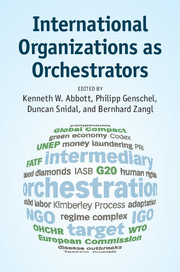Book contents
- Frontmatter
- Contents
- List of Figures
- List of Tables
- List of Contributors
- Acknowledgments
- List of Abbreviations
- Part I Introduction
- Part II Managing states
- Part III Bypassing states
- 8 WHO orchestrates?
- 9 Orchestrating peace?
- 10 Governing where focality is low
- 11 Orchestration for the “social partners” only
- 12 Orchestrating the fight against anonymous incorporation
- Part IV Implications
- References
- Index
9 - Orchestrating peace?
Civil war, conflict minerals and the United Nations Security Council
Published online by Cambridge University Press: 05 April 2015
- Frontmatter
- Contents
- List of Figures
- List of Tables
- List of Contributors
- Acknowledgments
- List of Abbreviations
- Part I Introduction
- Part II Managing states
- Part III Bypassing states
- 8 WHO orchestrates?
- 9 Orchestrating peace?
- 10 Governing where focality is low
- 11 Orchestration for the “social partners” only
- 12 Orchestrating the fight against anonymous incorporation
- Part IV Implications
- References
- Index
Summary
Abstract
We would expect to find little or no orchestration in the arena of security affairs, with issues of war and peace settled by states directly or delegated to the United Nations Security Council (UNSC). Yet as violence and instability increased in the 1990s with the end of the Cold War, both states and the UNSC found it more difficult to respond to mounting public pressure to intervene to prevent civil wars, ethnic cleansing and genocide. The Security Council is the primary (focal) international institution with responsibility for promoting peace and providing security, but its material resources are limited and its member states have divergent goals regarding intervention in conflicts. According to the propositions laid out in the framework chapter, these conditions should provide fertile ground for orchestration. In this chapter, I look at the relationship between the Security Council and a unique international organization – the Kimberley Process Certification Scheme (KPCS) – as one in which the UNSC orchestrated a response to civil conflict by mobilizing the private sector. While this case provides support for many of the hypotheses developed in the framework chapter, it also raises questions about leadership within an orchestration arrangement, the centrality of orchestration to the resolution of a problem and how the relationship changes over time.
- Type
- Chapter
- Information
- International Organizations as Orchestrators , pp. 214 - 236Publisher: Cambridge University PressPrint publication year: 2015
- 7
- Cited by

